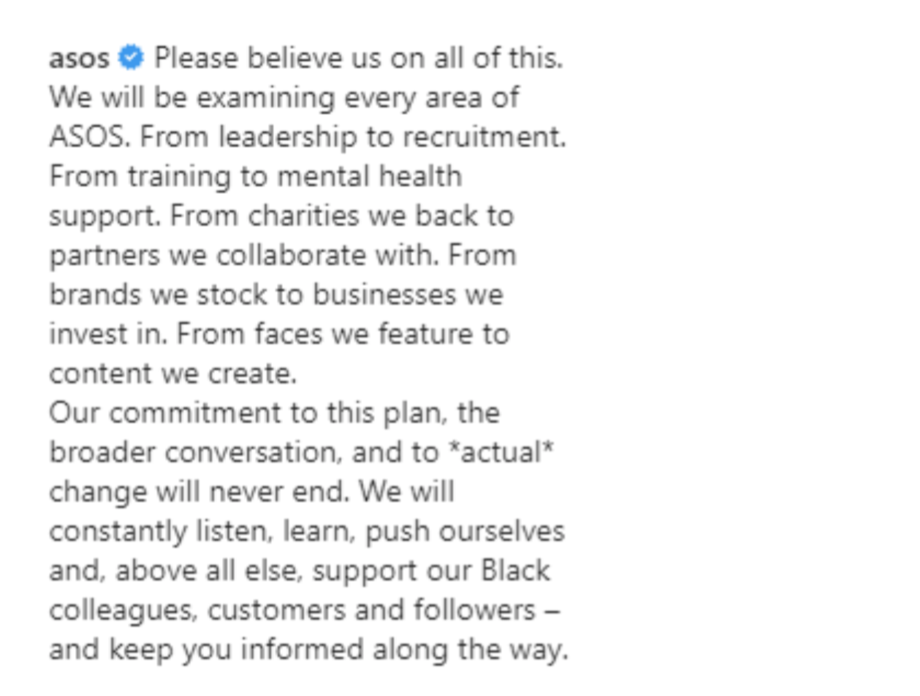OP-ED: How Brands Lie To Us Through Performative Activism
By The Sustainable Fashion Guru
In the wake of the Black Lives Matter (BLM) movement, fashion brands of all sizes took to social media earlier this year to express their allyship and support. But why did all of their posts look the same?
At this point, we are not strangers to the heartfelt Instagram text post. In fact, following allegations of modern slavery in their Leicester garment factories, Boohoo made a similar post:
As did Reformation - a purportedly ethical brand - after a racist company culture was exposed by ex-employee Elle Santiago:
Transparency is the word of the day, so brands are graciously conceding that they 'need to do better'. What they refuse to acknowledge is that they are a long, long way from even doing 'okay'.
There are a plethora of terms to describe what these brands are doing: woke-washing, ethics-washing, virtue signalling and more, but it can all be summed up by one… performative activism. Performative activism describes the exploitation of activism for social capital rather than because of one's devotion to a cause. Essentially, it’s about looking like you’re doing the work without actually doing it.
How can we spot performative activism? Let’s take a quick look at the language in these posts.
A total of twelve brands used the words “we stand with you”, or some approximation thereof (“stand united”, “we stand for equality”). Why? Because that’s a phrase that implies action, swift and deliberate. It means sticking out in a crowd, it's full of intentionality and impact. They want you to think that these statements mean something, that they're making some big, difficult and amazing change. Spoiler alert: they're not.
Exploiting people of colour to make their clothes, selling racially insensitive clothing, discriminating against models, displacing indigenous peoples, and cultural appropriation are the norm in the industry. Social media posts in support of relevant social issues are also the norm nowadays; what’s missing is the action that reflects these positive sentiments.
Brands are knowingly making promises that actually mean nothing. No measurable goals, no metrics, just 'doing more'. Forming a committee doesn't help unless those on it are qualified and properly compensated. Increasing the number of BIPOC (Black, Indigenous and people of colour) hires doesn't help unless the company invests in bias and diversity training. None of this means much if they’re continuing to exploit their garment workers.
The (over)use of the word 'together' feels underhand. Reminding us that they're not alone in racism, they're just doing what we all did. Is racism a systemic issue? Of course. However, this does not excuse them making millions through BIPOC labour and then turning around and saying "well, we were all doing it". Brands have more power than the average consumer, and with increased power comes increased responsibility.
It’s no accident that the majority of ‘support’ for BLM posts on Instagram look the same, nor that they say the same things - sometimes using the same exact wording. These are carefully crafted pieces of performative activism, designed to make the brands look “brave” or “unique” for taking a stance on social justice issues. But closer scrutiny brings their hypocrisy to light.
The Covid-19 pandemic has exposed the fashion industry’s issues like never before. The public are finally beginning to learn about what goes on behind the scenes, and it’s not pretty. Many of the brands whose posts we just saw promoting equality and standing for Black lives have cancelled huge clothing orders due to the pandemic, leaving workers destitute. The #payup campaign by Remake Our World has been calling these brands to stick by their orders and pay their suppliers, but many continued to ignore the situation. Dear fashion brands... You cannot claim to be anti-racist when you refuse to pay the marginalised people of colour who are making your clothes.
Meanwhile, working conditions are deteriorating even for those who do still work in garment manufacturing - even in the UK. ASOS’s warehouse in Barnsley, Yorkshire, has been described by workers as “a cradle of disease”. Boohoo have made the front pages for allegations of modern slavery in their factories in Leicester.
But how does this relate to Black Lives Matter movement?
The largest exporters of fashion are countries in the Global South, and the majority of garment workers, both in the UK, the US and abroad, are people of colour.
So, these brands sell clothes made by marginalised people, but they refuse to acknowledge or care about that. These brands continue to sell clothes made by oppressed, exploited and abused people, but they refuse to acknowledge that. It is becoming clear that the only Black people these brands support are those who buy their products.
Back in June, ASOS ended their #blm post with the sentence “please believe us”. Today, we must continue to ask the question, “do we believe them?” I say, we do not. Months have passed since these Instagram posts, but these brands haven’t changed. Their feeds might look a little different now, but they’re still the same at the core.
It’s time for us to step in, to amplify the voices of garment workers and people of colour worldwide, to recognise this manipulative marketing for what it is: a lie. It’s time to call out this performative activism and start holding the fashion industry to a higher standard.






